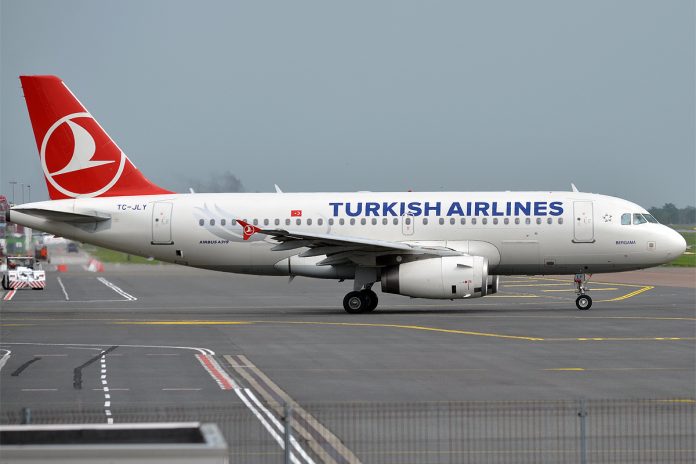- Turkish Airlines Expresses Willingness to Partner Nigerian Carriers
Turkish Airlines has said it is looking forward to effective code-sharing agreements in Nigeria, given that the country had a functional national carrier with a view to faciliate more flexible flight operations between Nigeria and other countries.
Country Manager for Turkish Airlines in Nigeria, Mr. Tarkan Ince, has stated this in an interview even as Copa Airlines and Turkish Airlines begin codeshare flights between Europe and Latin America.
According to Ince, “We have had many codesharing deals with many national carier across the world and we would have loved to strike similar deal in Nigeria. This would have facilitated more flexible flight operations between Nigeria and other countries where Turkish Airlines has flight rights.”
He, however, noted that the fact that Nigeria does not have a national carrier makes it impossible for foreign airlines to have effective codeshare agreements.
Meanwhile, with the new codeshare agreement between Turkish Airlines and Copa Airlines, passengers from several destinations in Latin America and Europe will enjoy seamless connections through the carriers’ ideally located hubs in Panama (Americas), and in Turkey, the bridge country that connects the East and the West.
Copa Airlines, subsidiary of Copa Holdings, S.A., and Turkish Airlines, both members of Star Alliance, the leading global airline network, signed a Codeshare Agreement which will offer passengers more flight options with seamless connections through Copa’s Hub of the Americas, in Panama City, and Turkish’s seamless gateway to Europe through the company’s Hub, in Istanbul, Turkey.
The strategic Hub of the Americas of Copa Airlines, in Panama City, will allow passengers coming from Istanbul fast and efficiently connect to 74 destinations in America and the Caribbean, including the most important cities of the region.
Also, with this codeshare agreement, the Latin American passengers traveling with Turkish Airlines through its uniquely positioned hub, Istanbul, that bridges the East and the West, will have more entry options to Europe also Africa, Asia/ Far East and Middle East.
Chief Executive Officer of Copa Airlines, Mr. Pedro Heilbron, said, “This agreement between Copa Airlines and Turkish Airlines has great importance since it contributes to strengthen the connectivity between Latin America with Istanbul and the rest of Europe. Passengers from both hemispheres will benefit from world-class services and seamless connections through the hubs of the codeshare partners.”
Initially, Turkish will place its code on Copa flights between Panama City and David in Panama; Porto Alegre, Rio de Janeiro, Manaus, Belo Horizonte and Sao Paulo in Brazil; Santo Domingo and Punta Cana in Dominican Republic; Guayaquil and Quito in Ecuador; San Salvador in El Salvador; Asuncion in Paraguay; Lima in Peru.
On the other hand, Copa will place its code on Turkish operated flights between Panama and Istanbul. Progressively, as government approvals are granted, Turkish will also place its code on Copa flights to Cancun, Mexico City, and Guadalajara in Mexico; Managua in Nicaragua; San Jose in Costa Rica and Montevideo in Uruguay in order to expand the range of these codeshare flights into the region.
“We are delighted to begin codeshare cooperation with Copa Airlines, which will improve our partnership as Star Alliance partners and also provide unique travel opportunities to the passengers through the far-reaching flight networks of both airlines. Especially, with our flights to Panama City operated from our incomparably positioned hub, Istanbul, passengers would enjoy to travel all around the continent with Copa Airlines’ flights from Panama City,” Deputy Chairman and Chief Executive Officer, Turkish Airlines, Mr. Bilal Ekşi, said.
The latest agreement, which complements and expands the route networks of both airlines as well as the connectivity between the continents, will also improve and promote bilateral opportunities for tourism and commercial developments between two countries.
According to Ekşi, “Passengers of Copa and Turkish will enjoy the multiple benefits offered by Star Alliance, including reciprocity between the frequent flyer programs of both airlines and global recognition of the Star Alliance Gold and Silver status through the large route network that includes 1,300 airports in 190 countries.”


 Billionaire Watch3 weeks ago
Billionaire Watch3 weeks ago
 Startups4 weeks ago
Startups4 weeks ago
 News4 weeks ago
News4 weeks ago
 News4 weeks ago
News4 weeks ago
 Bitcoin4 weeks ago
Bitcoin4 weeks ago
 Naira4 weeks ago
Naira4 weeks ago
 Forex3 weeks ago
Forex3 weeks ago
 Treasury Bills4 weeks ago
Treasury Bills4 weeks ago
























